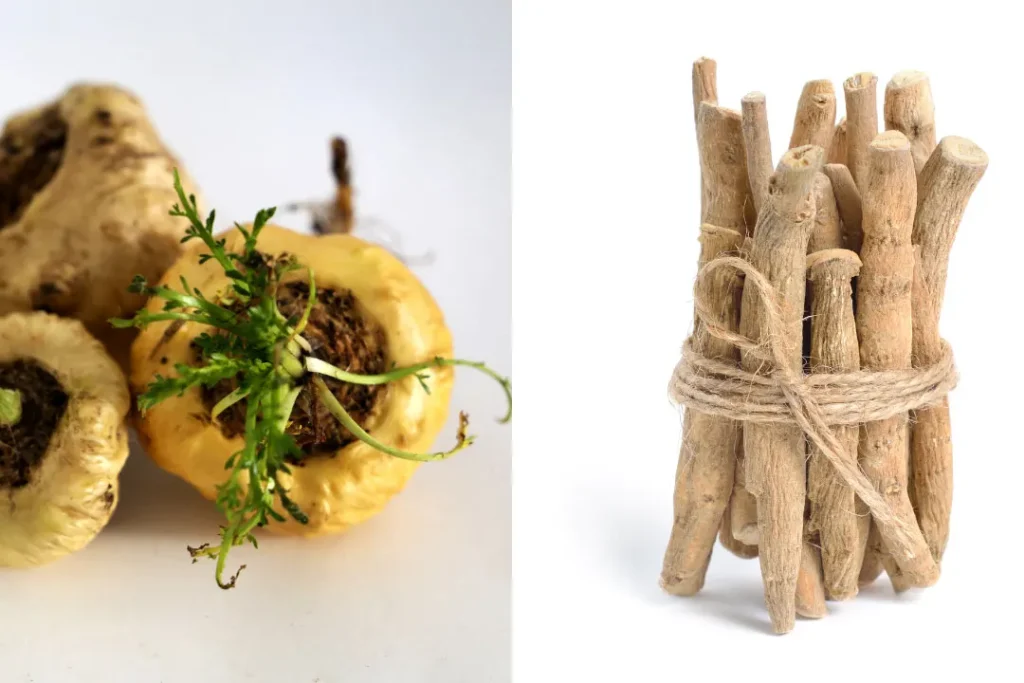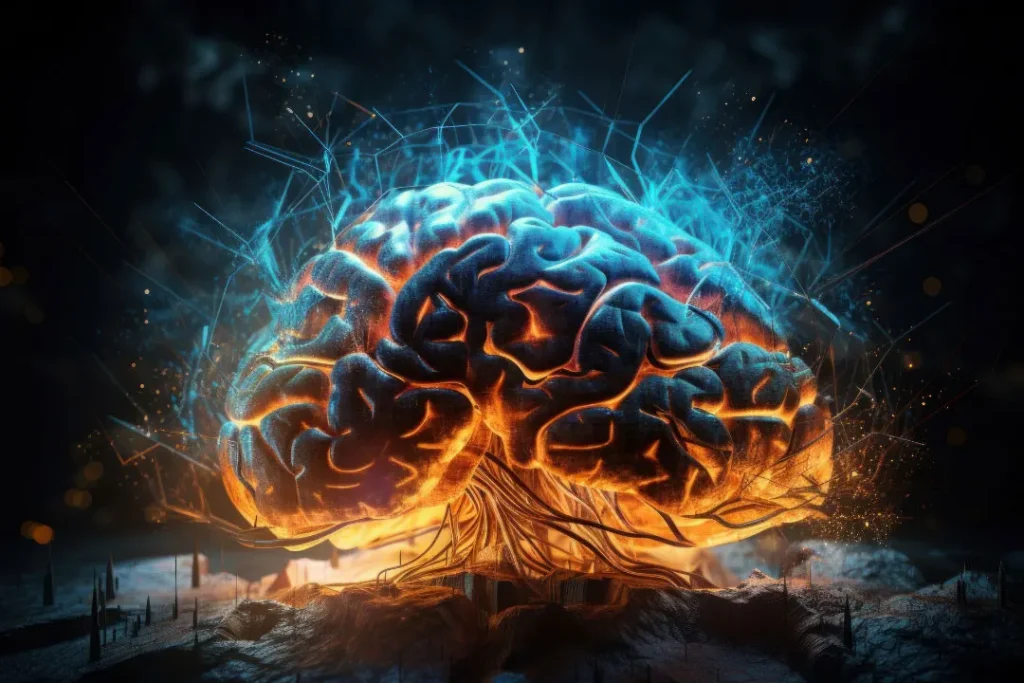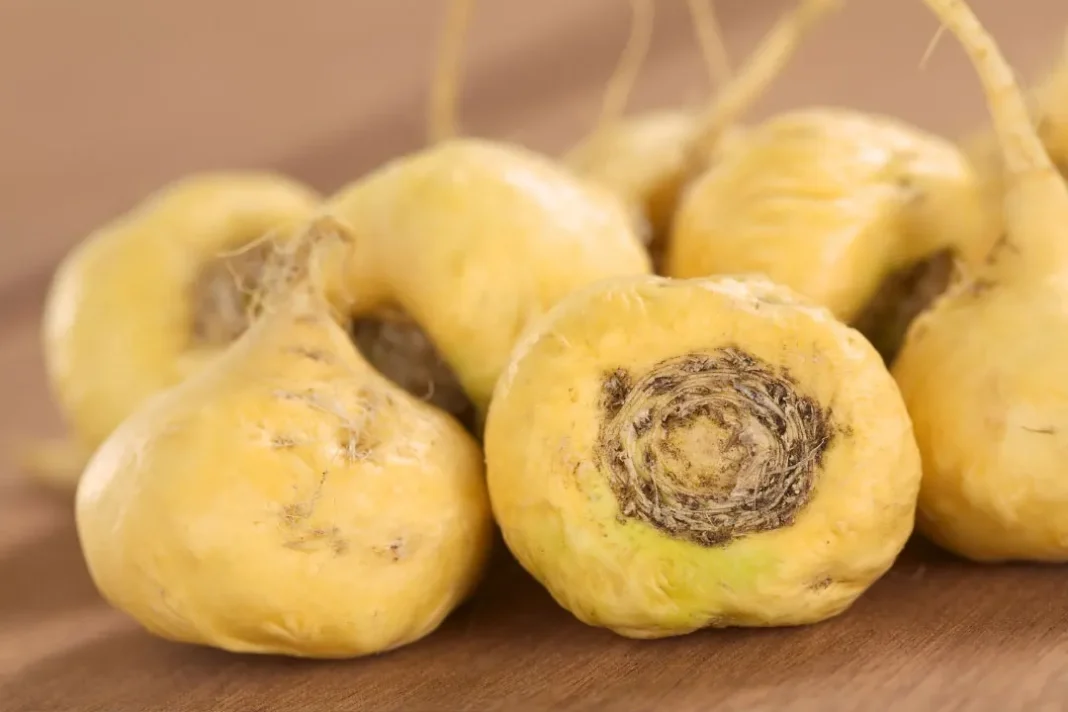Both maca root and ashwagandha have been used in traditional medicine for centuries, and they confer a range of potential health benefits, including reduced stress, increased energy, and enhanced sexual function. We’ll discuss five maca root and ashwagandha benefits and recommend a delicious honey product that delivers both herbs in a single, elegant package.
Maca root and ashwagandha are edible plants with various health benefits. The maca plant is a member of the cabbage-mustard family and is native to the Andes of South America. The entire plant is edible, although the root is most prized, and is commonly used as a folk remedy in traditional Peruvian medicine.
Ashwagandha, meanwhile, is a nightshade and can be found throughout India, the Middle East, and some of Africa. It also has medicinal applications and has been used in the Ayurvedic tradition for thousands of years. Although the two plants differ significantly in origin, their effects sometimes – but not always – overlap. The following are some of the maca root and ashwagandha benefits to be gained from combining the two, along with a suggestion for a delicious, high-quality product that blends them together.
You May Also Like:
Beyond the Hype: How CBD Can Help Seniors Enjoy a Better…
Kirkland Protein Bars VS Healthy Truth Plant-Based Protein Bars
Maca root and ashwagandha benefits to stress and anxiety relief
Stress is primarily felt as an adverse turn in one’s mood, but it can actually have dangerous implications for overall physical and mental health. Occasional stress is normal, even healthy, but sustained periods of unbearable stress can lead to a diminished immune system, mental illnesses like depression and anxiety, and even cardiovascular diseases.
Many supplementary products claim to be adaptogens or substances that provide stress relief. Maca root and ashwagandha both are in this category. Ashwagandha may have anti-stress effects; studies have shown that supplementing with ashwagandha can reduce stress biomarkers like cortisol. Maca root has similar a similar impact on the amount of cortisol released by the body, so in combination, maca root and ashwagandha can help to reduce stress.

Maca root and ashwagandha benefits to sexual function
Maca root and ashwagandha can also work together to enhance sexual function, although they do so by differing means. Maca root has been forwarded as a possible treatment for sexual dysfunction and can increase libido when taken regularly. It has been proposed that this is due to increased testosterone, one of the body’s hormones that help govern sex drive. Ashwagandha can improve fertility by increasing sperm count and motility, raising the chances of conception. Maca root and ashwagandha both benefit sexual function in general, but different aspects in particular, and by different methods.
Maca root and ashwagandha benefits to sleep
Sleep is vital to overall health, and any supplement regimen should attempt to support healthy, regular sleep. Together, maca root and ashwagandha benefit sleep health better than either could do alone. Ashwagandha was found to increase sleep quality in college students in a 2022 study.
This may be related to the reduction in stress-related biomarkers that sometimes comes with taking ashwagandha. Maca root, meanwhile, decreased sleep disruptions in menopausal women in a 2019 study. Maca root may help you get to sleep and stay that way, while ashwagandha may help ensure your sleep is restful and restorative.
Maca root and ashwagandha benefits to physical energy
Here’s where the benefits of maca root diverge from those of ashwagandha. Regarding boosting physical energy levels, ashwagandha is preferable to maca root. A 2021 review of clinical trials found that, in many cases, ashwagandha can enhance physical performance and increase muscle strength.
Maca root has been subject to some pilot studies about its benefits to athletes, but the results are far less significant compared to studies using ashwagandha. While further research may reveal additional maca root and ashwagandha benefits, for the moment, the consensus is that ashwagandha is a better source of energy for physical activity.

Maca root and ashwagandha benefits to mental energy
However, physical energy is not the only concern. In fact, for most people who lead balanced lives, the energy to perform complicated mental processes is equally important. Maca root and ashwagandha can help with that. Maca root can have a beneficial effect on mood, increasing motivation to complete trying mental tasks. Ashwagandha, meanwhile, may improve memory, executive function, and reaction time. There might be more evidence linking ashwagandha to physical energy, but there are both maca root and ashwagandha benefits to mental energy. Combining the two can increase the vitality of both body and mind.
One excellent, wholly unique product that can provide all of the above benefits is Medicine Man Plant Co.’s Power Honey. It mixes maca root and ashwagandha for both plants’ full spectrum of benefits into sweet, all-natural honey from the Texas-based apiary Uncommon Bees.
The honey can be eaten plain, spread onto toast or other food, or mixed into tea for an extra burst of energy. According to CEO and co-founder Steve Skiff, “Power Honey was created to optimize energy use and power output using plants that have an ancient history of use by warriors and athletes. Modern science can explain why. If you push your body to the limit, we can help you go further with ashwagandha and maca roots.” Power Honey is a delicious way to combine the powers of maca root and ashwagandha for wide-ranging health benefits.

Maca root and ashwagandha benefits for the whole body
Maca root and ashwagandha are two very different plants – they grow in different parts of the world, are members of different families, and are used in different schools of traditional medicine. However, their effects are remarkably similar but don’t overlap in every category. Where they have the same ultimate result, they use different methods to achieve it. Taking both maca root and ashwagandha benefits the whole body far better than either individual plant could do on its own.
For further reference:
NIH National Library of Medicine: Withania somnifera in male infertility
NIH National Library of Medicine: Is the hype around reproductive health claims of maca justified?
NIH National Library of Medicine: Maca reduces blood pressure and depression
Important Note: The information contained in this article is for general informational purposes only, and should not be construed as health or medical advice, nor is it intended to diagnose, prevent, treat, or cure any disease or health condition. Before embarking on any diet, fitness regimen, or program of nutritional supplementation, it is advisable to consult your healthcare professional in order to determine its safety and probable efficacy in terms of your individual state of health.
Regarding Nutritional Supplements Or Other Non-Prescription Health Products: If any nutritional supplements or other non-prescription health products are mentioned in the foregoing article, any claims or statements made about them have not been evaluated by the U.S. Food and Drug Administration, and such nutritional supplements or other health products are not intended to diagnose, treat, cure, or prevent any disease.





